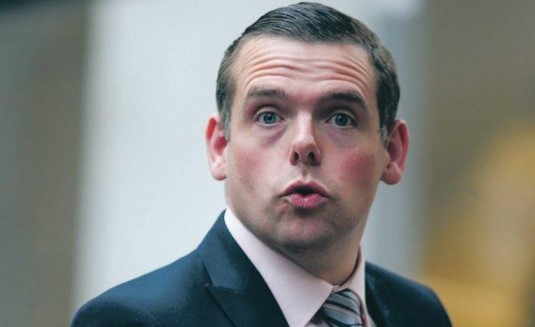
In remarks published by the Telegraph, Ross suggested that Tory voters should back Labour at the next general election to keep the SNP out. Well, the remarks were a little bit more Delphic. He argued unionist voters have enough tactical nous to know who to vote for when they want to put the country first, "... the public can see and they want the parties to accept that where there is a strongest candidate to beat the SNP you get behind that candidate.” The musings of the branch office manager didn't go down well in Westminster, with an unnamed spox suggesting voters should back Tory candidates wherever they're standing. Having received a stern talking to, Ross later backtracked and said Scottish voters should vote for the Scottish Conservatives, and that his musings about tactical voting was a clever-clever ruse to get Labour and Liberal Democrat supporters to give his party a punt where neither stand any chance against the SNP.
What Ross has done is merely enunciate the custom and practice of Tory and Labour activists since the great wipe out of 2015. For the Tories the maintenance of the union is the priority and, disgracefully, a large chunk of Scottish Labour thinks it trumps everything else as well. George Galloway's Britnat gymnastics of a couple of years ago reminded us of the fetid morass facing anyone who abandons the firm terrain of class politics: making common cause with the Tories obviously served Labour well eight years ago. But what is slightly unusual about Ross's musings is it's the Tories who are doing it. Normally, it has fallen to Labour politicians, albeit at the local level, to forge and apologise for alliances with the Tories to keep the SNP from running councils. Ross's argument just goes to show that the times are a-changing.
Since the cataclysm, Labour have effectively been the third party of Scottish politics. The hogging of the social democratic ground by the SNP (at least as far as appearances are concerned) and the dynamic leadership of Ruth Davidson turned Tory fortunes around. As with England, the slide in Tory support has little to do with Labour's weather-making. Following on from its worst ever Holyrood results in 2021, Anas Sarwar's leadership has steadied the boat and, to be fair to him and Scottish Labour, they have adopted a policy agenda more recognisably Labourist than the Westminster rudder. But the uptick in Labour fortunes is more a case of the Boris Johnson effect and the Liz Truss crash, and the departure of Nicola Sturgeon and subsequent SNP "troubles" than any genuine enthusiasm. Nevertheless, with the constitutional road to independence blocked and its falling down the rankings as the main priority for even SNP voters, suddenly Labour looks more attractive as a potential government in waiting. And that means the Scottish Conservatives return to their customary role as the junior partner in unionist politics. Ross then is making a plea for a de facto unionist pact to save as many Tory seats as he can from a position of weakness. It's an admission of defeat, and an acknowledgement that not many of them will be around after the next election.
Image Credit
No comments:
Post a Comment
Comments are under moderation.